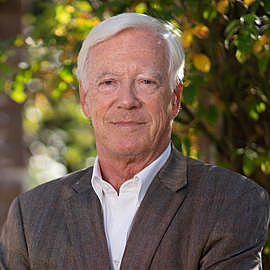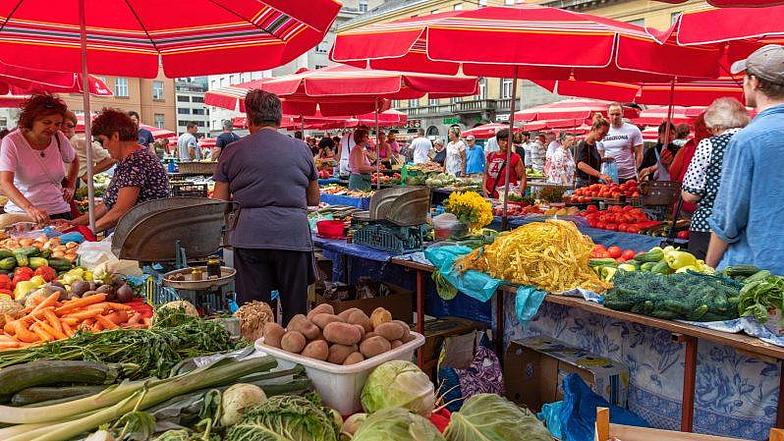
foodwatch/Christian Plambeck
Our collective survival cannot depend on individual consumer choices. Food policy is too important to be left to the companies that make and market our food. Real change will only come through clearer, bolder EU-wide targets and measures to lessen the environmental and health impacts of what we eat, writes Thilo Bode.
Imagine an EU policy on coronavirus which declared there was no role for public health officials or governments in safeguarding its citizens. One which claimed that the reaction to the pandemic was best left to consumer choice, the unfettered market, and self-regulating pharmaceutical companies.
You’d have to be insane to believe that was a good idea.
As director of foodwatch International, I’ve worked on food safety issues for nearly two decades.
I’ve watched with increasing alarm as EU policy has failed to grapple with the enormous environmental and health impacts of modern agriculture – impacts that today represent an existential threat to life on our planet from CO2 emissions, land depletion, and the poisoning of our air, soil and water.
When roughly two billion people worldwide lack access to safe, nutritious and sufficient food, 650 million suffer from obesity and 460 million adults are underweight, there’s clearly a systemic problem.
The European new start
The EU Commission’s proposal of a Green New Deal (including the Farm to Fork strategy) promised a new start, a transformation of our world’s food infrastructure.
But I foresaw trouble when a leaked copy of the Farm to Fork strategy landed recently on my desk with this statement:
“Citizen’s choices dictate what and how food is produced and can contribute to better health.”
Similar statements peppered throughout a later draft (it is still evolving) pay homage to consumers wanting more planet-friendly choices, and the important role of food producers and distributors in providing those choices – voluntarily. In vain I looked for bold, innovative, out-of-the-box thinking worthy of a plan to ensure our survival.
Instead, we have a plan dedicated to the survival of one thing: business as usual. Because at the heart of what could be the new policy is a very old myth. The vision of consumer as king. For food manufacturers, it’s a dream. For our children, it’s a nightmare. And for advocacy groups and NGOs, it represents a trap, in part of our own making.
The impossible choice
For decades, we’ve been encouraging ethical choices by consumers. We’ve told people that every purchase of a product is a vote for that product. And industries that benefit from price distortions have learned to roll with that punch and use its momentum like a judo master.
When we tell consumers that they can change the world with their choices, and that real choices exist, some do of course, but most of them choose the cheapest option. This is not an unethical choice, but rather a rational one and in accordance with the laws of competition that prevail in the market economy.
In the food market, the quality of food cannot be measured by its price. Cheap does not mean bad; expensive does not mean good. Therefore, the rational thought is: I’ll buy the cheap option. If I buy the expensive one and nobody else does, then I am the fool.
There is only one way to discourage bad environmental and health choices and it is not to appeal to individual ethics. It is to ensure that a product’s real costs are built into their price.
Aside from Greta Thunberg, how many of our most vocal climate activists consistently eschew travel by plane when a budget air ticket is a third the cost and four times as fast? That’s not a fair choice, that’s ethical extortion.
Worse, we already know that voluntary behaviour-change initiatives in the food sector don’t work. Germany’s agricultural reforms in the beginning of this century aimed to increase the percentage of organic farmland to 20% within a period of ten years.
Twenty years later, that figure is at 10%. Organic food? It’s 5% of total sales. 95% of the foods we consume today are still being conventionally grown, two decades after German consumers were asked, pretty please, to promote agricultural reform.
And yet we’re increasingly told that the individual holds all the power. It’s up to us to save the bees, repair the climate, and stop deforestation of the Amazon with the power of our wallets. Industry loves the idea that it’s us, not them that are responsible for change.
Government happily takes it up as an excuse for inaction. Consumers love it because it feels democratic. But ultimately, an Orwellian reversal turns the victims into the perpetrators, responsible for their own injury.
foodwatch demands
Our collective survival cannot depend on individual consumer choices. Food policy is too important to be left to the largely unaccountable companies that make and market our food. And write much of our food policy.
Real change will only come through clearer, bolder EU-wide targets and measures to lessen the environmental and health impacts of what we eat. Muscular monitoring. And higher prices reflecting real costs and offering real consumer protection.
It will depend on governments accepting that their primary mission is not the coddling of industry, but the safekeeping of our citizens, their planet, and their future. The EU Green Deal and Farm to Fork strategy need to be a driving force of this mission- but they aren’t yet.
A chance to give them real substance is still there, if enough consumer groups, governments and others demand it.
Adam Smith told us that the “invisible hand” of the market would provide all of humanity’s needs.
The COVID-19 pandemic is teaching us that the unfettered market won’t save us.
That assertive and proactive government response to threats to our survival are essential. That we can and should make hard choices to value human lives over economic growth. And that business as usual is not an effective response to crisis.
